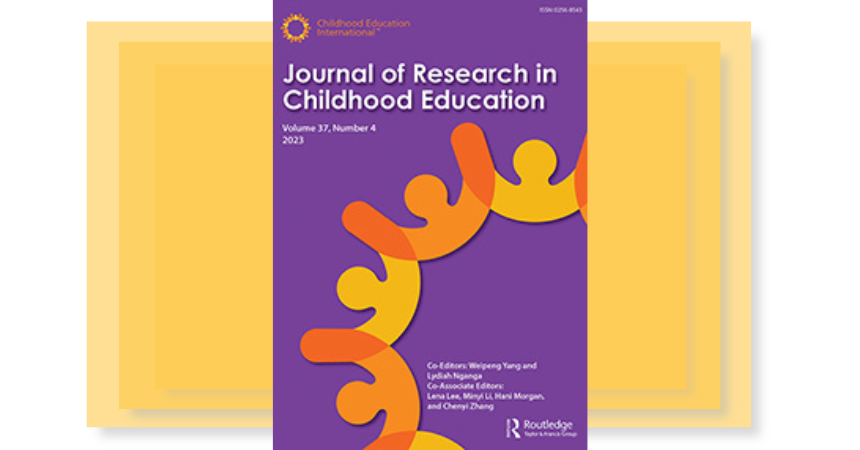Setting Strong Foundations for Early Learning: Lessons from the Global South on Early Childhood Education


Childhood Education International is excited to announce the publication of a special issue of the Journal of Research in Childhood Education.
Setting Strong Foundations for Early Learning: Lessons from the Global South on Early Childhood Education features research on a variety of aspects of early childhood education programs and their outcomes across diverse contexts in low- and lower-middle income countries, including in Mexico, Jamaica, Pakistan, Uganda, and Bangladesh.
The issue features collaborative efforts between researchers from the Global South and Global North and spotlights research from the Early Learning Partnership, a multi-donor trust fund housed at the World Bank that aims to identify effective practices within low-resource settings.
Articles employ both qualitative and quantitative methods and focus on topics including:
The articles emphasize the important role of early childhood education in shaping children’s learning outcomes, as well as the critical need for policymakers, governments, funders, and others to focus on the most marginalized young children in the Global South.
The articles in this issue are free and publicly available without a subscription, reflecting our hope that they reach a wide audience and have a significant impact on the future of ECE.
by Pauline Rose, Monazza Aslam, and Bea Simpson
The introduction explains the purpose of the special issue and highlights key focus areas of the articles, including:
• The impact of the COVID-19 pandemic
• ECE and school readiness
• ECE systems, data, and donor coordination
by Sergio Cárdenas, David K. Evans, and Peter Holland
This article presents evidence on the effects of a low-cost, group-based ECE program in rural communities in six Mexican states.
by Taja Francis, Lelys Dinarte-Diaz, Shawn Powers, and Helen Baker-Henningham
This article examines the impact of a 10-week program focused on early childhood, violence prevention, and parenting in Jamaica.
by Maureen Samms-Vaughan, Sydonnie Pellington, and Rosan Reynolds-Salmon
This article outlines impacts of the COVID-19 pandemic on young children and families in Jamaica. Some key findings include financial difficulties, reduced access to education, increased parenting demands, and increased levels of corporal punishment.
by Janice Kim, Mesele Araya, Pauline Rose, and Tassew Woldehanna
This article investigates the impact of the COVID-19 pandemic on pre-primary-age children’s school readiness in Ethiopia.
by Richard Shukia and Stansilaus Marobo
This study examined parental engagement in their children’s pre-primary education in socioeconomically deprived settings in Tanzania. Finding the potential for greater learning loss during the pandemic among children in this group, it points to the importance of additional support for these parents and children.
by Abbie Raikes
As countries make investments in early childhood care and education systems, data and measurement play a critical role in outlining strengths and areas for improvement. This article focuses on the role of measurement in ECCE and key issues facing ECCE data and measurement.
By Monazza Aslam, Saba Saeed, Belay Hagos, and Baela Jamil
This study explores the degree of engagement of parents/caregivers of preschool children in Ethiopia and Pakistan and the modes of learning they used for home learning during COVID-19 school closures.
by Mohammad Safayet Khan, Erum Mariam, Nasrin Akter Akhi, Esrat Jahan, and Sakila Yesmin
Pashe Achhi is a telecommunication model that emerged out of the COVID-19 pandemic in Bangladesh to provide support for children ages 0-5 and their caregivers through mobile-to-mobile calls. This article examined the impact of the intervention.
by Bea Simpson, Mary Goretti Nakabugo, and Ricardo Sabates
In Uganda, access to early childhood education is limited for children from disadvantaged families, particularly refugees. This article examines the level of access to and learning outcomes from ECE among refugees in Uganda over time.
by Amna Ansari, Tazeen Fasih, and Ella Humphry
This article explores early childhood education administration across two accountability relationships in Pakistan’s most populous province, Punjab. The results indicate a need to strengthen the province’s early learning system and improve the flow of accountability through effective delegation, finance, information, and motivation.
By Rachel Hinton, Holly Scott, Shawn Powers, and Salim Salamah
Although there has been a recent increase in investment in ECE, the share of official development assistance for ECE remains extremely low. This article provides considerations for researchers, practitioners, and policymakers interested in increasing donor finance for ECE.
We are grateful to Education Development Trust for their support and to the UK Foreign Commonwealth and Development Office for providing the funding to enable all the articles to be open access.
Learn more about the Journal of Research in Childhood Education
Explore CE International's consulting services.